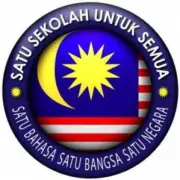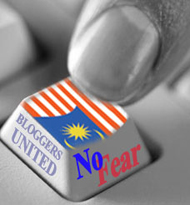Today marks the 53rd celebrations of Merdeka. Its time the spirit on the birth of this nation is relived and kept alive, as a motivation for us to move forward.
The next year will mark the 500th anniversary of a Malay Empire on the Malay Peninsular being invaded and overan by a European nation using force. By early 20th century, Johor was the last state that when under the British Administration. In all, the Malay Peninsular had been under European (with a brief period 3 years 8 months under Japanese and 3 weeks under the Malayan Peoples’ Anti Japanese Army) occupancy for 446 years.
The spirit of nationalism became an integral part of the Malays to emancipate themselves being colonies of several states for over 400 years. Names like Dato Maharaja Lela, Dato Sagor, Laksamana Muhamand Amin, Dato Naning, Dato Bahaman, Tok Janggut are the legendary icon for th struggle.
The move to request for Merdeka was solidified after the first General Election where British allowed 52 out of 98 membership to the Federal Consultative Council be contested by the rakyat. Political parties staged their candidates in this first free democratic process to elected the representatives of the rakyat.
UMNO, which successfully campaigned to fail Malayan Union on 1 May 1946. The overwhelming support that was amassed amongst the Malays had never been seen before. The Malays, then comprises mainly by small holding farmers, odd job labourers, teachers and low grade civil servants gave the trust for aristocrats and technocrats to take the lead. The spirit of nationalism unprecendently emancipated the Malays and that motivated the masses to move further.
UMNO later in the 1950s fostered a co-operation with MCA and MIC to form the Alliance Party and contested in thw 1955 General Elections. The Alliance Party swept 51 of the 52 seats contested .The sole seat that lost was a PAS seat. That gave UMNO President Tunku Abdul Rahman Putra the mandate to assume the Chief Minister of the Federation of Malaya position and form the first self-ruling government by the rakyat. Depsite being a blue blood, Tunku embraced the spirit of Malay nationalism and drove the struggle there on with wit and wisdom.
This mandate allowed Tunku and his government to have a position to negotiate for independence. First was with HRH Rulers. Since British gave HRH Rulers the ‘first right of refusal’ to take over the governance of Federation of Malaya, Tunku had to convince HRHs to give up that right in favour of Westminster-style constitutional monarchy.
The ‘first right of refusal’ offered to HRH Rulers is not without precedence. First of all, British took over the management of most Malaysian states and were ‘annexed’ as British colony when HRH Rulers signed treaties. When Malayan Union was failed, British negotiated with HRH Rulers and the Treaty of Federation of Malaya (Perjanjian Persekutuan Tanah Melayu) came into force on 1 February 1948.
The Federation of Malaya Constitution that came into force upon Merdeka on 31 August 1957 evolved from the Treaty of the Federation of Malaya. Specific articles like Article 152 and 153 which provided special rights to the Malays were enacted in the spirit of HRH Rulers role in the Treaty of the Federation of Malaya and rights as the hereditary rulers of the land. At the enforcement of the Treaty of the Federation of Malaya, only the Malays are ‘subjects of HRH Rulers’ where else majority of the Chinese and Indian ethnics are considered ‘stateless persons’.
UMNO President Tunku who managed to convince HRH Rulers for the terms of the independence and brought the mandate of the rakyat of the Federation of Malaya agreed unconditionally to accept almost 1 million of these ‘stateless persons’ as citizens of soon to be the new born sovereign nation.
This is the ‘sacrifice’ of Tunku as the leader of UMNO and the Malays. During the 1955 General Elections, UMNO contested in only 35 out of the 52 seats (which translated to only 67% of the seats contested) despite 84% of the registered voters are Malays, as opposed to 11% Chinese and 3% Indians. UMNO managed to advocate the Malays to vote for the Alliance Party and gave MCA the 15 seats and MIC 2 seats in the Federal Consultative Council. UMNO only assumed 6 out of 10 Cabinet post.
Tunku via UMNO managed to convince the Malays to actually come out and voted the MCA candidates at the time where the Communist Rebels, which more than 95% of them are of Chinese ethnicity. His wisdom overpowered the hurt, pain and anguish that the Malays endure, especially persons involved in the security forces (majority of them are Malays) to give the MCA the votes they needed.
Nationalism was the fundamental of UMNO’s struggle for the Malays. The spirit of nationalism amassed the Malays to come out in full force which failed the Malayan Union. The same spirit was the basis when HRH Rulers agreed on the Treaty of the Federation of Malaya on 1 February 1948. The nationalism spirit that drove the Malays towards ‘Merdeka’ was also the basis of the strong mandate for the 1955 General Elections. Nationalism was the spirit when HRH Rulers consented for Federation of Malaya to be governed by the rakyat. Tunku also based the spirit of nationalism when he agreed on the unconditional citizenship of almost 1 million stateless persons.
The spirit of nationalism is the key success factor of the nation’s security ever since the struggle against communist armed rebellion officially declared on 16 June 1948 till the present fight against terrorism by the security forces.
The spirit of nationalism was also the underlying factor the New Economic Policy introduced in 1971 as a solution to transform and re-engineer the majority of the underdeveloped Malaysians, mainly in the rural areas. This socio-economic development plan was the key factor of the stability and harmony that enabled Malaysia to have economic growth and progress, till present stage and all the achievements throughout. This holistic stability, harmony, progress and growth was the underlying factor of Malaysia’s ambition in 1991 to be a developed nation by 2020.
Nationalism is the spirit that brought the rakyat forward in taking charge and deciding the fate of the nation. Nationalism is the ideology which will carry Malaysia through the next 50 years of nationhood. Its time to bring that spirit that emancipated Malaya (Malaysia) from the shackles of being colonised, fighting an imported armed rebellion and driven Malaysia and Malaysians to what she is, today.
SELAMAT MENYABUT HARI KEMERDEKAAN ke 53








Dan juga, sempena hari sambutan kemerdekaan ini, kita sama-sama memperjuangkan kemerdekaan sistem pendidikan dari elemen-elemen anti-nasional, demi anak bangsa kita.
MERDEKA!
Sudah 53 tahun Merdeka…tapi masih ketinggalan dari minda dan ekonomi…..ish ish…..Indonesia akan mengatasi kamu semua…Singapura dah negeri pertama dah….
Kamu orang Singapura ke? Kalau betul ckaplah. Supaya kita tahu siapa yang coba memperlekehkan Malaysia.
Kalau kamu Spore, tak payah nak bising kat sinilah. Kamu tak ada tempat nak bersuara pun diSpore. Tak berani. Dikentut LKY, ditambat, dilokap, dipenjara atau disaman sampai bankrap. Di sini kami nak coba niak kepala pulak. Jenis yang kesian kamu ni.
Singapore pulau tak sbesar mana pun. Itu pun rakyatnya digam mulutnya bahru boleh perintah. Apa kamu mau cakap “kamu semua”? Budak kecil punya pikiran.
Kepada semua lapisan rakyat Malaysia, dari saya dengan sudi hati mengucapkan “Selamat menyabut Hari Kemerdekaan”. Semoganya negara kita aman, maju dan tenteram.
BD,
The Portuguese and Dutch occupation of Malacca and the British occupation of the Straits Settlements cannot be treated as occupation of the whole of Malaya.
Even adjacent states like Johor and Negeri Sembilan, then known as Sungai Ujong, had not been ruled by those foreign powers until the British did late in the 19th Century. Until then, the Malays were a distinct entity in Johor, ruling themselves variously from a place near present day Paguh, Kota Tinggi and Johor Lama as the capital. The Sultan of Malacca ran away to Johor and later one of the Bugis seafaring princes set up base and founded the present Johor dynasty.
There were many attempts to oust the Portuguese and Dutch by the Malays based in Johore. Even when the British interfered in the affairs of Malaya after the Pangkor Treaty of 1874, they at first managed to get only Perak, Selangor, Negeri Sembilan and Pahang as the Federated Malay States under their rule. It was only later that Johore, Trengganu, Kelantan and Kedah came under the ambit of British rule and known as the Unfederated Malay States.
So I would say that it was only Malacca that was under foreign occupation for 446 years.
But I agree with you that the spirit of nationalism and patriotism runs high all over the country. Especially in Malacca where the Malayan delegation went to announce the success of their negotiations for independence 53 years ago. It was a symbolic gesture of getting freedom from the clutches of the bloody imperialists starting from the Portuguese for a total of 446 years in Malacca.
Nak cari spirit 1946…? Kena main “spirit of the coin” ni… hehehe… dah kes tahyul ni.
Sepatutnya ikut pak mufti mencari roh al-Quran dan sunnah yang telah lama kita tinggalkan. Itulah punca sebenar kecelaruan kita.
[…] Bukan Melayu terutama etnik Cina dilihat sebagai mula lantang dan ‘kurang ajar’ dalam tuntutan mereka, sehingga ditegur oleh DYMM Raja Raja Melayu. Namun pemimpin UMNO masih dilihat sebagai ‘bermain selamat’ (play safe) dengan beralah dan tidak bersedia untuk mencabar tuntutan yang semakin dilihat mensasari norma dan nilai kesefahaman bagaimana negara ini lahir pada 31 Ogos 1957. […]
[…] dengan itu, semangat nasionalism 1946 yang berjaya dijana dikalangan massa orang Melayu adalah bekal yang bermakna untuk menentukan […]
[…] fundamental of the struggle for independence was all about Malay nationalism. It was Malay nationalism which succesfully fought against the Malayan Union. It was the same spirit that propelled from the “Hidup Melayu” battle-cry towards […]
[…] fundamental of the struggle for independence was all about Malay nationalism. It was Malay nationalism which succesfully fought against the Malayan Union. It was the same spirit that propelled from the “Hidup Melayu” battle-cry towards “Merdeka” […]